From "Espresso" to the "Human Library"
Vancouver is one of the most beautiful cities in Canada, but spends the least on the arts. Despite this dismal statistic, marvelous playwrights and theatre creators make this city their home. We make work in bathrooms and on mountaintops. We have to. We want to. Audiences are adventuresome and real estate is prohibitively expensive. Our careers can span working for the largest theatres to the most experimental. We are connected to theatre innovators in Europe, across Canada, the United States, and Asia…all of whom influence us, but we make our own work.
Our theatre is female-friendly and we aren’t afraid to rappel.
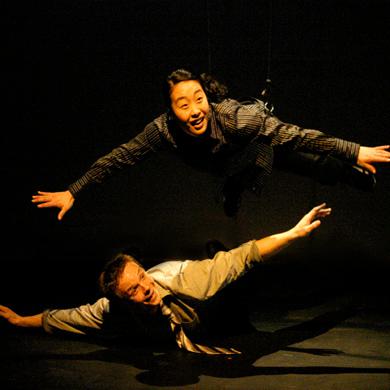
Our theatre is female-friendly and we aren’t afraid to rappel. When the innovative Boca del Lupo company staged The Shoes That Were Danced to Pieces in our 1001-acre Stanley Park, the narrator and all the princesses rappelled from the tall trees. Katrina Dunn, now Artistic Director of Touchstone Theatre, rappelled out of a back street window in the site specific Five Blood Alley in our historic Gastown neighborhood. Katrina recently programmed an all female playwright season as artistic director, and didn’t notice. She didn’t notice! Ruby Slippers Theatre, led by artistic director Diane Brown has earned their reputation for “smart social satire” staging Brecht in the Parks, Herotica and Herotica 2, and comic political cabarets with a swaggeringly fun aesthetic. Mom’s the Word was created here—when agents told new mom actresses their careers were over (including Deborah Williams*, they wrote their own show, now an international money making trilogy. Kathleen Weiss, the artistic director of the now defunct Women in View Theatre Festival, helped us create an energy you don’t get from individual shows, fostering dialogue and momentum.
A theatre inclusive of our many cultures is hard won in a city with Victorian roots. Fortunately, there is deep and abiding interest in making new work, advocacy, passion, and co-operation. These co-operations include Progress Lab 1422—founded by Boca del Lupo, The Electric Company, NeWorld Theatre, and Rumble Productions. Progress Lab’s latest project, Obstructions, involves eleven of Vancouver’s best companies, each providing artistic challenges to one another. Their HIVE micro-theatre party events are considered must see and are unbelievably fun. The scene has become too varied to describe it all.
Here are a few of the playwrights who live here: Carmen Aguirre (check out her best selling memoir about growing up in the Chilean resistance, Memoirs of a Revolutionary Daughter, her solo shows, and The Refugee Hotel), Lucia Frangione (the glorious Espresso, Paradise Garden, and Fresco, exploring Italian internment here during World War II), Marcus Youssef* (his satires on the war on terror, Winners and Losers with James Long, A Line in the Sand with Guillermo Verdecchia, Adrift), Marie Clements (the film/play that helped bring attention to the missing Native women on “Skid Row,” Unnatural and Accidental Women, Burning Vision, and The Edward Curtis Project: A Modern Picture Story), and Chris Gatchalian* (author of Crossing, Broken, and Falling in Time, a brash, deep play about masculinity/love/the Korean War, up for the LAMBDA literary prize this year.) Their talents have come to full force; their plays are published and easily available. This is not to mention the marvelous artistic director/prolific author Aaron Bushkowsky (Strangers Among Us, After Jerusalem, My Chernobyl), Sally Clark (Moo, Life Without Instruction, Saint Frances of Hollywood), creator/performer/dramaturg Lisa C. Ravenbergen* (now writing The Seventh Fire, The World is the World, The Art of Peace), actor/screenwriter/playwright Quelemia Sparrow (Tales of a Native Narcissist), Adrienne Wong* (creator/performer/producer of numerous innovative projects including audio plays for specific geographies) and Hiro Kanagawa (Patron Saint of Stanley Park, Tiger of Malaya) and story editor on CBC’s Da Vinci’s Inquest and Da Vinci City Hall, actor on Smallville, Fantastic Four, Caprica, the X-Files. Our playwrights’ work is fostered by the forty-year-old Playwrights Theatre Center, run by the artistic and executive Director, Heidi Taylor.*
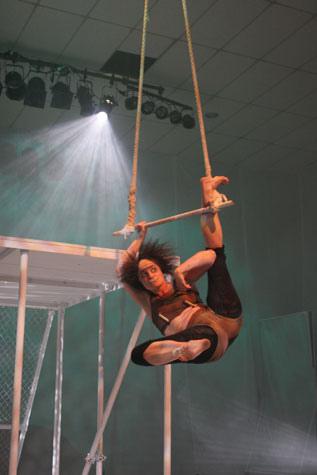
When returning to Vancouver this fall, I was worried. The recent closing of our regional theatre, the Vancouver Playhouse, just shy of their 50th anniversary doesn’t bode well for our theatre ecology. Playwright/actor Lucia Frangione protested the closure (along with many others) by crawling on her hands and knees, writing her entire play in chalk on the sidewalk from the Playhouse to City Hall. We Canadians continue the good fight to pay artists a living wage, or at least an honorarium, and work hard to do so. Recent cuts to the arts and culture have been the deepest in our history. Arts workers have been laid off, shows cancelled. Others scramble to survive despite severe cuts to their income in an increasingly expensive city.
In spite of this, our dedicated artists create work inclusive of varied genders, ages, and cultures. Here is a sample of what I saw in this year’s season:
- Reneltta Arluk’s heartrending, brave solo show Tumit directed by Kathleen Weiss and Thrasso Petras, at Full Circle: First Nations Performance's Talking Stick Festival founded by Margo Kane with Lisa C. Ravenbergen, now celebrating their ten-year anniversary.
- Pangaea Arts’ The One-Eyed Troll and The Selkie, a series of interactive, skillfully told folk tales incorporating masks and puppetry. Founder /co-artistic director Heidi Specht (with her talented husband Len Stanga) is one of the first women to play the clown character in Chinese Opera, and won the prestigious Uchimura Naoya Prize from the International Theatre Institute (a sub-organization of UNESCO) for their dissemination of Japanese theatre and culture around the world.
- Headlines Theatre’s maladjusted, an examination of the failings of the medical industry, spearheaded by David Diamond and his team, employing the poignant and politically effective techniques developed by Augusto Boal.
The recent closing of our regional theatre, the Vancouver Playhouse, just shy of their 50th anniversary doesn’t bode well for our theatre ecology.
J. Kelly Nestruck of The Globe and Mail identified a “reality theatre” trend in Canada. In Europe, it’s known as “Reality Trend” or “Theater der Zeit.” Many shows exemplified this shift. In Theatre Conspiracy’s Extraction, which looked at the issues surrounding the tar/oil sands in Alberta, they didn’t employ actors—the people in the real situations appeared on stage. Marilyn Norry and Jenn Griffin’s project My Mother’s Story, beautifully directed by Heidi Specht, was based on tell all accounts of daughters, many of whom performed them. Deb Williams’* The Flame storytelling event was broadcast for Christmas, with real stories by J.J. Lee (author of the gorgeous memoir, Measure of a Man), Diane Brown, Aaron Bushkowsky, Lucia Frangione, and others. Not long after, I was asked to write and perform my own story. The Flame is an exciting, transformative challenge, building a rare intimacy.
Western Canada’s largest theatre, the Arts Club’s programming was especially impressive. Rachel Ditor* is their literary manager. They produced:
- Yvette Nolan’s brilliant The Unplugging, the story of two Native women who know how to survive in a believable dystopia, and the young man who will do anything to get their knowledge, directed by Lois Anderson.
- How Has My Love Affected You? Marcus Youssef’s lovely, humorous and valiant struggle to deal with his mother’s prolific journals, her Alzheimer’s and the complicated legacy his son inherits, directed by Rachel Ditor.
- Bill Richardson’s hilarious and tender Do You Want What I Have Got: A Craigslist Cantata with songs by Veda Hille, directed by Amiel Gladstone.
One of the most exciting theatrical adventures I had this year was attending the PuSh International Performing Arts Festival, now in its tenth year. Artistic director Norman Armour, who founded the festival with Katrina Dunn, focuses on work that is “visionary, genre-bending, multi-disciplined, startling and original” and “showcases acclaimed international, Canadian and local artists and mixes them together with an alchemy that inspires audiences, rejuvenates artists, stimulates the industry and forges productive relationships around the globe.”
I chose to go to their most genre-bending productions. My family “checked out” several people at the Human Library, curated by Vancouver playwright Dave Deveau, including an “Internet Pirate” and a “Challenged De-clutterer” to hear their stories one-on-one. Stop the Violence (Copenhagen, Denmark) created the project, now an international phenomenon, to end hate crimes. One of the organizers was enormously moved to see so many people line up “to have a conversation.” My nine-year old daughter went wild over Sometimes I think, I Can See You created by Mariano Pensotti of Buenos Aires, Argentina. Writers were stationed at the Vancouver Public Library and Art Gallery, where they would write about a passerby, posting on screens nearby. My daughter adored being fictionalized. The piece that moved me the most was, Do You See What I Mean? Created by French choreographers Martin Chaput and Martial Chazallon from Projet in situ (Lyon, France). I was blindfolded for over two hours and led by a trained PuSH Festival volunteer around the city. The experience was carefully crafted, and included a visit to a record shop, a clothing store, a physicist’s apartment for tea—where he explained the visible spectrum using a knotted cord, a duet with a professional dancer, auditory theatre, and being led by a blind woman (who was deeply articulate about textures and the newly treacherous phenomena of doors and cars). The kind of care shown by those making this piece was heart altering. I hadn’t realized how dominant sight can be, and was able to experience the full universe of sound, smell, touch, my body in space…. in my city.
Vancouver, you are prolific and exciting. Just don’t forget to appreciate what you’ve got goin’ on. Restoring provincial funding, supporting the film industry through varying incentives will keep our vital theatre community alive.
_________________________________________
*Denotes contributors to HowlRound’s Vancouver city series.

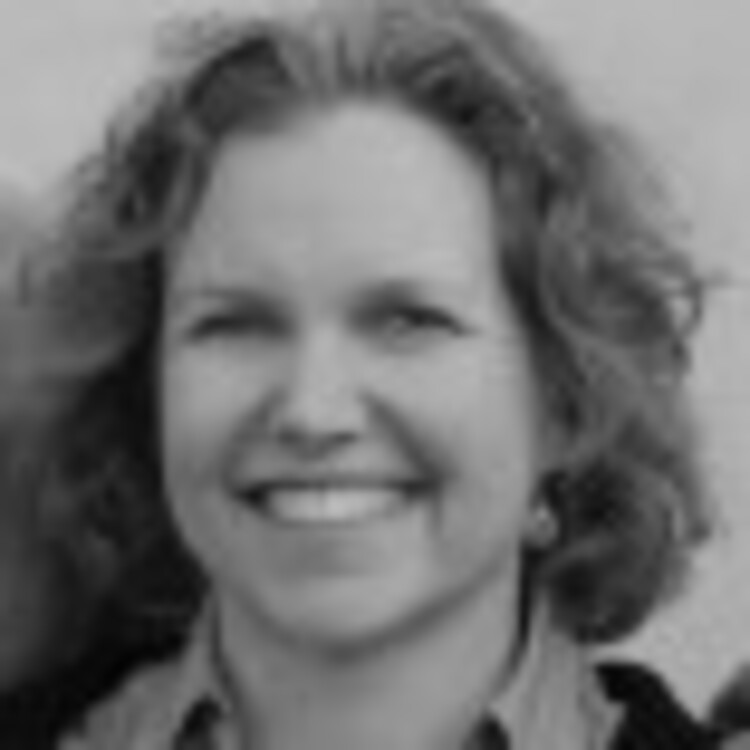
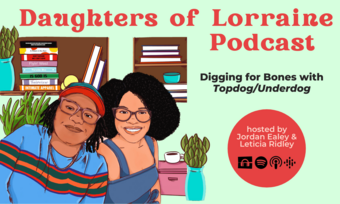





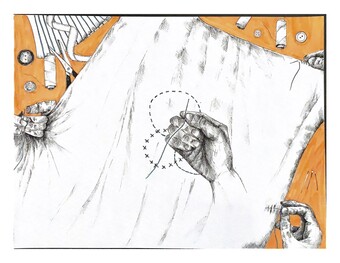






Comments
The article is just the start of the conversation—we want to know what you think about this subject, too! HowlRound is a space for knowledge-sharing, and we welcome spirited, thoughtful, and on-topic dialogue. Find our full comments policy here
Great article! We sound wonderful.
P.S. If you are coming to LMDA, Electric Company (mentioned in my article above) has a new play on—"You Are Very Star." http://electriccompanytheat...
P.P.S. Vancouver’s funding is more complex than I’ve laid out here. The City of Vancouver is forward thinking, good stats, and exciting
innovations. Here is a quote from our mayor-- “Vancouver’s artistic community is a major economic driver and we want to do all we can to ensure local performers thrive…”—Mayor Gregor Robertson
I refer to our overall #s as weak—the national
average for provincial arts funding: $26 per capita, British Columbia: $6.50 per capita; we have been 13th place among the provinces and territories in
terms of per capita spending on Arts and Culture for most of the last decade.
Sources include: http://www.artsadvocacybc.ca;
http://stopbcartscuts.ca This report by the Vancouver Foundation gives a better picture
as well. http://2007.vancouverfounda...
I hope that the people of Vancouver and the province of British Columbia will continue advocating to bring up our averages and to support our film industry (http://www.savebcfilm.ca).
These are the issues I refer to, that have a difficult impact on theatre companies and the lives of individual artists.